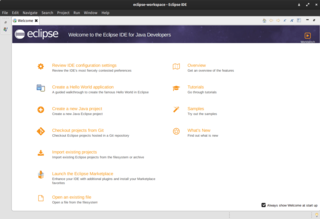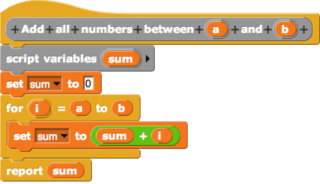Related Research Articles

Eclipse is an integrated development environment (IDE) used in computer programming. It contains a base workspace and an extensible plug-in system for customizing the environment. It is the second-most-popular IDE for Java development, and, until 2016, was the most popular. Eclipse is written mostly in Java and its primary use is for developing Java applications, but it may also be used to develop applications in other programming languages via plug-ins, including Ada, ABAP, C, C++, C#, Clojure, COBOL, D, Erlang, Fortran, Groovy, Haskell, JavaScript, Julia, Lasso, Lua, NATURAL, Perl, PHP, Prolog, Python, R, Ruby, Rust, Scala, and Scheme. It can also be used to develop documents with LaTeX and packages for the software Mathematica. Development environments include the Eclipse Java development tools (JDT) for Java and Scala, Eclipse CDT for C/C++, and Eclipse PDT for PHP, among others.

In computing, a visual programming language or block coding is a programming language that lets users create programs by manipulating program elements graphically rather than by specifying them textually. A VPL allows programming with visual expressions, spatial arrangements of text and graphic symbols, used either as elements of syntax or secondary notation. For example, many VPLs are based on the idea of "boxes and arrows", where boxes or other screen objects are treated as entities, connected by arrows, lines or arcs which represent relations.
An agent-based model (ABM) is a computational model for simulating the actions and interactions of autonomous agents in order to understand the behavior of a system and what governs its outcomes. It combines elements of game theory, complex systems, emergence, computational sociology, multi-agent systems, and evolutionary programming. Monte Carlo methods are used to understand the stochasticity of these models. Particularly within ecology, ABMs are also called individual-based models (IBMs). A review of recent literature on individual-based models, agent-based models, and multiagent systems shows that ABMs are used in many scientific domains including biology, ecology and social science. Agent-based modeling is related to, but distinct from, the concept of multi-agent systems or multi-agent simulation in that the goal of ABM is to search for explanatory insight into the collective behavior of agents obeying simple rules, typically in natural systems, rather than in designing agents or solving specific practical or engineering problems.
PlatBox Project, formally known as Boxed Economy Project, is a multi-agent based computer simulation software development project founded by Iba Laboratory at Keio University, Japan. The main work of PlatBox Project is to develop PlatBox Simulator and Component Builder, which are claimed to be the first multi-agent computer simulation software that do not require end-users to have any computer programming skill in order to create and execute multi-agent computer simulation models. Currently, the project is organized by Takashi Iba, assistant professor from Keio University, and Nozomu Aoyama. PlatBox Simulator and Component Builder are currently offered only in Japanese; however, the English version is expected to be out anytime soon.
ParadisEO is a white-box object-oriented framework dedicated to the flexible design of metaheuristics. It uses EO, a template-based, ANSI-C++ compliant computation library. ParadisEO is portable across both Windows system and sequential platforms. ParadisEO is distributed under the CeCill license and can be used under several environments.
In the last few years, the agent-based modeling (ABM) community has developed several practical agent based modeling toolkits that enable individuals to develop agent-based applications. More and more such toolkits are coming into existence, and each toolkit has a variety of characteristics. Several individuals have made attempts to compare toolkits to each other. Below is a chart intended to capture many of the features that are important to ABM toolkit users.
Web-based simulation (WBS) is the invocation of computer simulation services over the World Wide Web, specifically through a web browser. Increasingly, the web is being looked upon as an environment for providing modeling and simulation applications, and as such, is an emerging area of investigation within the simulation community.

AnyLogic is a multimethod simulation modeling tool developed by The AnyLogic Company. It supports agent-based, discrete event, and system dynamics simulation methodologies. AnyLogic is cross-platform simulation software that works on Windows, macOS and Linux. AnyLogic is used to simulate: markets and competition, healthcare, manufacturing, supply chains and logistics, retail, business processes, social and ecosystem dynamics, defense, project and asset management, pedestrian dynamics and road traffic, IT, and aerospace.
Agent-based social simulation consists of social simulations that are based on agent-based modeling, and implemented using artificial agent technologies. Agent-based social simulation is a scientific discipline concerned with simulation of social phenomena, using computer-based multiagent models. In these simulations, persons or group of persons are represented by agents. MABSS is a combination of social science, multiagent simulation and computer simulation.
JACK Intelligent Agents is a framework in Java for multi-agent system development. JACK Intelligent Agents was built by Agent Oriented Software Pty. Ltd. (AOS) and is a third generation agent platform building on the experiences of the Procedural Reasoning System (PRS) and Distributed Multi-Agent Reasoning System (dMARS). JACK is one of the few multi-agent systems that uses the BDI software model and provides its own Java-based plan language and graphical planning tools.
graph-tool is a Python module for manipulation and statistical analysis of graphs. The core data structures and algorithms of graph-tool are implemented in C++, making extensive use of metaprogramming, based heavily on the Boost Graph Library. Many algorithms are implemented in parallel using OpenMP, which provides increased performance on multi-core architectures.

GAMA is a simulation platform with a complete modelling and simulation integrated development environment (IDE) for building spatially explicit agent-based simulations.
References
- "Agent'97 Repast", agent2002.anl.gov.
- North, M.J.; Collier, N.T.; Vos, J.R. (2006), "Experiences Creating Three Implementations of the Repast Agent Modeling Toolkit", ACM Transactions on Modeling and Computer Simulation, 16 (1): 1–25, CiteSeerX 10.1.1.331.2313 , doi:10.1145/1122012.1122013, S2CID 14249726
- North, M.J.; Tatara, E.; Collier, N.T.; Ozik, J. (2007), "Visual Agent-based Model Development with Repast Simphony" (PDF), Proceedings of the Agent 2007 Conference on Complex Interaction and Social Emergence, Argonne National Laboratory, Argonne, IL USA
- Barnes, D.J.; Chu, D. (2010), Introduction to Modelling for Biosciences, Springer Verlag